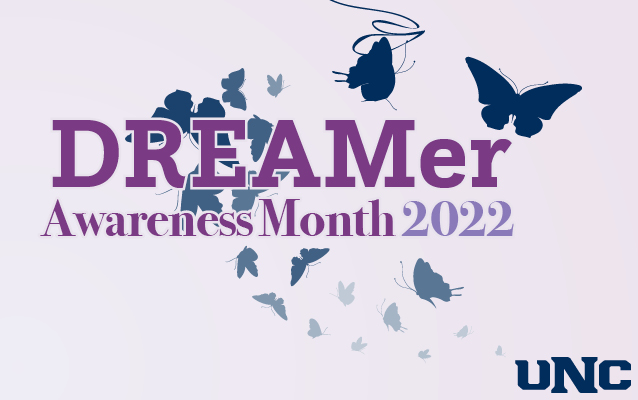In March, UNC celebrates DREAMer Awareness Month. The Development, Relief, and Education for Alien Minors (DREAM) Act was initially introduced in 2001 with the intention of helping undocumented students become citizens if they arrived in the United States prior to the age of 16. While multiple versions of this Act have been introduced in Congress over the past 20 years, they have all maintained a similar goal of creating a pathway to citizenship for undocumented persons and not one has become law. Students began using the term ‘DREAMer’ as a way to interrupt socialized ideas and terminology that are often used to describe them, such as illegal, alien, criminal, and so forth.
Originally initiated by the Obama administration in 2012, the Deferred Action for Childhood Arrivals (DACA) programprovided a reprieve from deportation. This program allows students and young adults to apply for a driver's license, social security number, and work permit. According to the Higher Education Immigration Portal (a project of the Presidents’ Alliance on Higher Education and Immigration), there are more than 427,000 undocumented students enrolled in college and universities in the United States. Of those students, 181,000 are DACA-eligible.
For the past several years, the status of DACA has wavered in the courts, and the tumultuous political climate has made students’ lives more difficult, stressful, and fearful especially knowing their fate of deportation is in the hands of political debate. One of President Biden’s earliest acts in office was to propose the U.S. Citizenship Act of 2021 bill to Congress. This act was a clear message that the Biden Administration is committed to modernizing our current immigration system and that working toward next steps to grant permanent legal status and other protections remain priorities.
At UNC, the DREAMer Engagement Program (DEP) and Undocumented Student Services led by Rudy Vargas, provide outreach and support to students by connecting students to other campus services, legal support, DACA renewal services, admissions, financial aid, and scholarship services available to them.
Take Action:
- Attend the DREAMer Awareness Month events available to you, including:
- IFS Film Screening of Forbidden: Undocumented and Queer in Rural America
- Undocu-Week
- Keynote Speaker: Julio Salgado
- Attend a DREAMer Zone training
- Learn more about the diverse and intersectional identities of DREAMers such as Undocublack and Undocuqueer
- Donate to the UNC Dreamer/DACA fund. One-time or recurring gifts are accommodated
- ACLU Know Your Rights: Immigrants’ Rights
- Navigating Graduate School: Resource Guide for Undocumented Students
- Life After College: A Guide for Undocumented Students
- Connect with the DEP through Instagram
- Attach the DREAMer Awareness Month design elements to your email signature and/or use it in your social media
For additional education and personal development related to diversity, equity and inclusion, the following resources are available: DEI Education and Resources, DEI & Antiracism Resources from the UNC Libraries, the Education Equity Toolkit from the Colorado Department of Higher Education, and the UNITE workshops for faculty, staff, and students.


